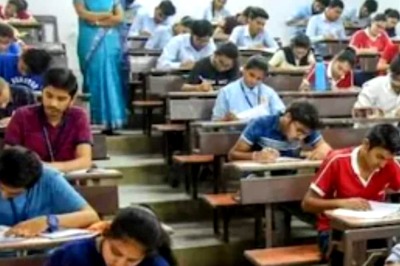
views
Cairo: Egypt's army called on protesters to avoid harming the nation on a fifth day of demonstrations that have increasingly targeted generals running the country.
In a televised statement, the army warned against protests that "deviated from peaceful means". It repeated its vow to hand power to civilians and pledged support for the prime minister.
The protest that began on Friday is one of the longest running demonstrations since Hosni Mubarak was toppled on Feb. 11. The army has promised a parliamentary election in September with a presidential vote to follow.
Protesters are growing increasingly angry in their complaints about foot-dragging in trying Mubarak and his officials and they want swifter reforms. Mubarak's trial for his role in killing protesters in the uprising is set for Aug. 3.
"Down, down with military rule," chanted demonstrators among the thousands in Cairo's Tahrir Square on Tuesday. Others marched to the nearby cabinet building shouting: "The people want the removal of the Field Marshal."
Field Marshal Mohammed Hussein Tantawi, who leads the ruling army council, was Mubarak's defence minister for two decades.
There have been protests in the port cities of Alexandria and Suez, where some gathered outside a Suez Canal administration building. An official said the canal was operating normally.
The protests and threat of escalation has hit the Egyptian stock market, where the benchmark index closed down almost 3 percent at an eight-week low.
Protesters have dismissed as inadequate two televised addresses by the prime minister promising a cabinet resuffle. There have also been several other concessions, such as a ruling to let a television camera into corruption and other trials.
"The armed forces feels its historic responsibility and role towards the nation and calls on honourable citizens to stand against any protests that prevent the return of normal life," General Mohsen Fangary said, reading out the statement.
SAME POLICIES
Protesters in Tahrir have blocked the traffic and prevented employees from entering a big government administrative building on the edge of the square. They dismissed the army statement.
"The military council is following the same policies as the ousted regime," said Mohamed Abdel Waged, 43, who has joined those camping in Tahrir in tents and under big white canopies.
Reflecting their determination both to placate crowds and return order, generals also held a news conference on Tuesday.
"All opinions and demands of people are taken into consideration; this conference is to clarify our vision," General Mahmoud Hegazy of military council said.
He added that the army would "work to end" the protest by all legal means but that: "There is no scenario or option of using violence at any time against the protest."
In Prime Minister Essam Sharaf's latest address on Monday night he promised a cabinet reshuffle within a week.
"The prime minister did not say which ministers will leave or who will replace them," Mohamed Adel, a leader of Egypt's April Six Youth group, said in Tahrir.
Later, the resignation of Deputy Prime Minister Yehia el-Gamal was accepted. Demonstrators had said he was ineffectual and should go.
Adel added: "We still ask for an end to the trying of civilians in military courts and the independence of the judiciary system, and those demands have not yet been met."
In the army news conference, General Mamdouh Shahin defended the use of military courts. "Military courts did not judge anyone for his opinion but ... it only tried those who carried out major crimes, according to law," he said.
Sharaf had earlier asked Interior Minister Mansour el-Essawy to speed up measures to restore security in Egypt, reshuffle provincial governors and asked judges to make the trials of Mubarak's former officials public.
CONCESSIONS
In Alexandria, demonstrators chanted slogans against the army and against the the prime minister. "Sharaf, Sharaf go resign and kiss the Field Marshal's hands," they said.
In a concession towards more transparency in trials, a judge said a camera would be allowed in to court to let those outside see what was happening. It was not clear if sessions would be broadcast on public channels.
The government said on Monday it would raise the minimum wage, another demand of protesters.
In the most recent corruption trial, former Prime Minister Ahmed Nazif, who investors had praised for economic liberalisation measures that fired up Egypt's economy, was given a one-year suspended jail sentence.
The former interior minister, Habib al-Adli and ex-finance minister Youssef Boutrous Ghali, got five and 10 years in jail. Both have received jail terms in earlier cases. Boutros-Ghali has been tried in absentia.
But demonstrators are most keen to see the trials of Mubarak and ministers over the killing of more than 840 protesters during the protests after police used live ammunition, rubber bullets and batons to try to beat back the demonstrators.
Protesters accuse the military of being reluctant to proceed faster with trying Mubarak, a former air force commander. Mubarak is now hospitalised in a Red Sea resort, which some Egyptians regard as a ploy to prevent public humiliation.
Hassan Nafaa, a political scientist and activist, said the army would be "forced to choose to make a decision about whether it wants to follow the spirit of the revolution ... or protect Mubarak as it used to be part of his regime."
The Muslim Brotherhood, Egypt's most organised political group, had joined Friday's protest but said it would not continue.
"The group has suspended its participation after Friday but I think it will issue a statement later today or tomorrow explaining its reaction to the prime minister's speech," said Walid Shalaby, the group's media coordinator.




















Comments
0 comment